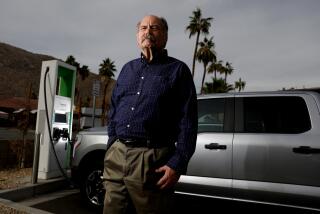PUC emails appear to show former chief Michael Peevey overstepping his role
SACRAMENTO — Thousands of emails newly released by the state Public Utilities Commission present a damaging portrait of former PUC President Michael Peevey as a micromanaging, domineering leader who appears to have overstepped his role.
Peevey involved himself personally in internal decision-making at Pacific Gas & Electric Co. — the state’s largest utility — including its corporate leadership, political public relations strategy, safety policies and rate-setting cases, affecting billions of customer dollars, documents show.
The 65,000 emails offer a rare glimpse into the inner workings of the commission and are likely to fuel ongoing state and federal investigations.
Peevey and the PUC have been under scrutiny for months amid growing frustration by city officials, lawmakers and activists over their close relationship with the utilities they regulate. Such under-the-radar contacts between Peevey and utility executives also appear to be at the core of an ongoing probe at the PUC by the U.S. attorney’s office in San Francisco and the California attorney general’s office.
Californians depend on an independent PUC to monitor utility safety, set rates, ensure reliability and protect the environment.
“The bottom line is that I am amazed,” said Robert McCullough, an energy industry consultant and a former longtime manager at Portland General Electric in Oregon, who has analyzed thousands of the emails.
“Peevey has passed beyond” improper contacts with PG&E, McCullough said, and took on a “role where he was commenting and recommending promotions at PG&E. In effect, he was acting as a member of senior management” and “had clearly redefined the role of CPUC commissioner into a freewheeling advocate for the firm.”
At age 76, Peevey stepped down at year-end after serving two six-year terms as head of the PUC. Last week state law enforcement authorities searched the La Cañada Flintridge home of Peevey and his wife, Democratic state Sen. Carol Liu. Also searched was the Bay Area residence of former PG&E executive Brian Cherry, who was fired by the utility in September.
Mark Toney, executive director of the Utility Reform Group, estimated that the email banter and “backroom deals” have cost PG&E ratepayers millions if not billions of dollars, because they may have prejudiced legal decisions, including rate setting.
“A regulator is supposed to have an arms-length relationship with the utility,” the ratepayer advocate said, “not an embracing relationship.”
Toney added that Peevey had strong influence over how other members of the five-person commission might vote on issues.
Officials of San Bruno, the San Francisco Bay Area city where eight people died in a PG&E pipeline explosion in September 2010, also expressed outrage at the contacts between the PUC and the utility.
“I think we need to characterize itas collusion,” City Manager Connie Jackson said.
Asked to comment on the email disclosures, PG&E said in a statement Tuesday that it made “no excuses for past instances of unethical conduct.” The San Francisco company now is “absolutely committed to doing the right thing,” the statement said.
PG&E spokesman Keith Stephens described “the vast majority of the 65,000 communications” as “completely appropriate.” Nevertheless, he stressed that Cherry; his boss, Thomas Bottorff; and another executive were fired after emails indicated that PUC rules had been violated.
Improper communications between the regulator and the utilities it regulates violate PUC policy. That’s because in many proceedings they could be seen as giving unfair and one-sided access to decision makers, without equal access to other parties.
Neither Peevey nor Cherry could be reached by phone for comment.
A search warrant served on the homes of Peevey and Cherry on Jan. 27 said investigators were looking for evidence of improper communications, as well as shopping for sympathetic PUC judges, preferential treatment, bribery and other wrongdoing.
The emails show that Peevey took a close interest and involved himself in PG&E’s management and operations. In April 2011, seven months after the San Bruno blast, multiple emails detailed efforts to arrange a meeting between Peevey and PG&E Chief Executive Peter Darbee at Jardiniere, a French restaurant in San Francisco.
The main topic was the effectiveness of Darbee’s leadership, according to an email to Peevey from Bottorff.
Darbee retired a few weeks later, prompting a follow-up note from Peevey to Cherry hinting that the PUC president may have played a role. “The board did the right thing (with a little nudge) this morning. Maybe the beginning of a new, better leaf,” Peevey wrote.
Another email dealt with top personnel promotions at the utility. Peevey thanked Bottorff for “running” the names of the candidates “by me.”
Later that year, Peevey gave Cherry tactical advice about how to influence Gov. Jerry Brown about upcoming commissioner appointments at the PUC.
In closing, he acerbically warned Cherry that “you will miss Arnold,” referring to the just departed Republican Gov. Arnold Schwarzenegger.
In another 2011 email, Peevey asked Cherry if anyone at PG&E belonged to the Bohemian Club, a members-only men’s club with a rustic retreat for its rich and powerful members in the Northern California redwoods.
Peevey, the former president of Southern California Edison Co., said he wanted a connection so he could host a party for retiring Edison lobbyist Bruce Foster.
PG&E couldn’t help, and the ritzy dinner was held for Foster at the St. Francis Yacht Club in San Francisco. Peevey helped organize the fete and served as the master of ceremonies at the industry-sponsored dinner.
Peevey’s contacts with PG&E’s Cherry were “almost familial,” said an exasperated state Sen. Jerry Hill (D-San Mateo), whose district includes San Bruno. The relationship as portrayed in the latest emails may not “cross the legal line,” he said, “but it still crosses the moral and ethical line. That’s the part that is troubling.”
Twitter: @MarcLifsher







